24 Apr 2013
“I’m sorry … what?”: a visit to the Met Office Hadley Centre
The other day a friend and I took our young sons on a tour of the Met Office’s centre near Exeter. The Met Office is home to the Hadley Centre, one of the foremost centres where climate modelling and research into climate change takes place. It was to turn out to be an event I left both angry and puzzled, and with some reflections I’d like to share here. The tour itself is of little consequence to this piece, other than to say that it managed to turn what could have been really interesting hour’s tour into a fairly tedious 3 hours, and certainly not a tour designed to sustain children’s interest. The low point for me, however, was when we actually reached the Hadley Centre. So, picture the scene …
My group of around 40, mostly pensioners on a group trip, arrive in the empty (well it is a Saturday) offices of the Hadley Centre. Now for those who don’t know, the Hadley Centre is kind of climate research holy ground. Here’s what their website says about what they do:
“We produce world-class guidance on the science of climate change and provide a focus in the UK for the scientific issues associated with climate science. Largely co-funded by Department of Energy and Climate Change (DECC) and Defra (the Department for Environment, Food and Rural Affairs), we provide in-depth information to, and advise, the Government on climate science issues. As one of the world’s leading centres for climate science research, our scientists make significant contributions to peer-reviewed literature and to a variety of climate science reports, including the Assessment Report of the IPCC. Our climate projections were the basis for the Stern Review on the Economics of Climate Change”.
It’s a huge, fairly non-descript office, and we stand in a horse shoe shape around our tour guide (our kids are bored senseless by now and have gone off for a wander around the desks, so I’ve got one eye on them and one eye on our guide). He starts to tell us that this is one of the foremost centres of climate research in the world, whose data and models underpin much of the work going on around the world.
He says (or words to this effect), “throughout history, the world has, on previous occasions, warmed to a far greater degree than we are seeing today. In that larger historical context, the warming we are seeing today is relatively minor. For me, I think it is inevitable that we will burn our way through all the fossil fuels there are. For example, I myself drive a very fuel inefficient car, I think you might as well have fun using it up”. I was stunned.
He then went on, as he did on many occasions on the tour, to wax lyrical about the Met Office’s offices, and how energy efficient and state-of-the-art they are. When it came to time for questions, my friend asked him “from what you have said, you have made it sound as though climate change is an entirely natural phenomenon that human activity has had no influence over. Would you like to clarify this?” The guide then said that well no of course he hadn’t meant that, and that of course it was entirely due to human activity, and that he hadn’t meant to give such an impression.
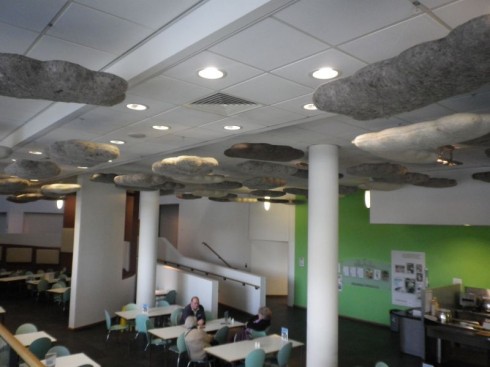
My own personal highlight of the tour: the woollen ‘clouds’ hanging from the ceiling in the Met Office canteen.
I asked him how it was for him to be working in the Hadley Centre with all the kind of data and information that they process and study. In the US, climate scientists such as James Hansen are stepping out from behind scientific impartiality and getting arrested to stop coal trucks and the like. Did he, I asked, feel any compulsion to do anything similar? He said that as a civil servant (the Met Office is a UK government institution) they are contractually prevented from taking part in any demonstrations. He then went on to give a very good overview of the melting of the Arctic ice, and why it mattered, why it represented an alarming feedback loop and so on. But for me the damage was done.
Day after day he and his colleagues take the Great British Public around the Met Office, and take them into the Hadley Centre and talk about climate change. With public confidence in climate science precarious to say the least, and with papers like the Daily Mail still publishing mind-rotting nonsense about climate change, if there is one place in the world people can be put right and hear it like it is must surely be in the Hadley Centre. He stressed that they have to be very careful not to be ‘political’, not to give their opinion in terms of what we can do about climate change, rather just focus on the science. But we didn’t hear any of that. He could have said that:
- Global temperatures have already risen 0.8°C on pre-industrial levels, with another 0.6°C unavoidable due to the lagtime in impacts of emissions
- The world’s most respected scientific institutions have all stated that there is strong evidence that human activity is driving the rise in temperature
- Even relatively small levels of carbon dioxide have been shown to have a range of impacts around the world
- On our current trajectory of emissions, scientists estimate rises of between 2.4°C and 6.4°C by 2100
- Of the 2,795 gigatons of carbon we have identified, the science tells us we can only burn 565 gigatons of it if we want to keep the world’s temperature below 2°C
- We are already seeing weather extremes and climate impacts, such as the melting of the Arctic ice, which is accelerating alarmingly
Nothing contentious or ‘political’ there. Presumably that kind of thing is in the reports that the Hadley Centre publish day in, day out, as their bread and butter. Or they could just show them this pie chart: 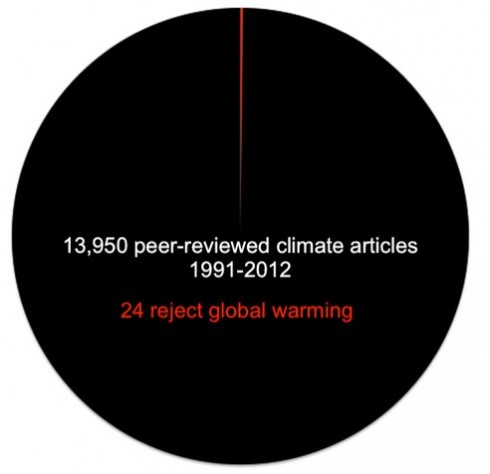
They could ask the older members of the tour if, during their lifetimes they have noticed the climate changing, and hear their stories. But no, what we got was an attempted humorous piece about how you couldn’t do anything about it anyway so you may as well just keep driving until the fossil fuels are all gone. I can appreciate that giving tour after tour to people who may appear indifferent to what you are talking about might lead you to a position where you end up making light of it in order to keep their attention. But it is lazy, and it’s a complete abdication of the responsibility inherent in being a representative of the Hadley Centre, standing in the Hadley Centre.
I was reminded of George Marshall’s excellent recent article Reasons why recent disasters might not increase concern about climate change. Marshall visited a town in Texas where 1,700 homes had recently been lost in a huge fire, whose cause was directly linked to climate change. You often hear, after yet another “exceptional” disastrous natural weather event “what will it take for people to see that climate change is happening?” As Marshall puts it: “Disasters can increase social confidence and certainty”. His piece is fascinating in that in the face of such an event, those who believed in climate change believed in it more strongly, seeing the fires as proof of their belief, and those who didn’t similarly used the experience to bolster their position.
He has written that:
“Climate change awareness is complex and strongly mediated by socially constructed attitudes. It is important to recognise that many of the social and cultural obstacles to belief are not removed by major impacts and may, indeed, be reinforced”.
When you are rooted in a particular analysis of climate change, it is increasingly easy to surround yourself with people and media that support your world view. Twitter allows us to just access news from people we agree with. Google, based on the websites we visit, begins to filter our worldview to we only hear news we agree with. We seek out newspapers that support that worldview. It is only on rare occasions, such as a coach trip to visit the Met Office, to find out how they do the weather forecast on the telly, that our worldview can be authoritatively changed.
Had I, as someone who spends my working life dedicated to climate activism, been told authoritatively that I was wrong to be concerned about the melting of the Arctic ice, it would certainly have been food for thought and I would have gone away and looked into it. As Marshall puts it:
“Accepting anthropogenic climate change requires a high degree of self-criticism and even self-doubt. It requires a preparedness to accept personal responsibility for collective errors and for entire societies to accept the need for major collective change. And, inevitably, this process of acceptance would generate intense debate and conflict”.
What better opportunity for such a discussion than a Saturday morning at the Met Office? Maybe I just got a poor tour guide. Maybe everyone else gets the kind of presentation I suggested above apart from my group. Maybe the experience of those leading those tours is that if they discuss climate change in a meaningful way people rise up and start tossing the waste paper baskets and staplers at them. Or maybe it’s just easier to make light of it, to send people home with the impression that climate change isn’t their fault, nor is there anything they can do about it.
If we have a serious health issue, one that we have been in denial about, one that we fill our days with distractions to avoid really acknowledging, and one where we avoid our friends who want to tell it like it really is, then we need a very particular set of circumstances to bring us to our senses. As Marshall’s piece has shown, even an episode of poor health can be justified and attributed to something else. What we need is to be standing in a doctor’s room, and to have him/her tell it like it is, to set out our prognosis with clarity and compassion.
To get to the point of standing in that room can be a journey in itself, but once you’re there, it is the skill of the doctor to be able to tell it like it is. If they make a joke of it, and tell you how much of an effort it is to get better, how the medicine is horrible and he wouldn’t take it himself as it’s more fun not to, that would be the most appalling dereliction of duty. My tour of the Hadley Centre felt very much like encountering such a doctor. Shame.
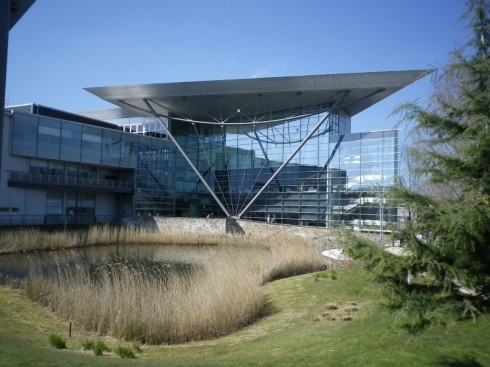
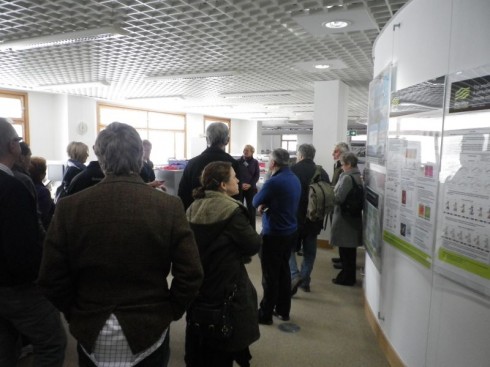
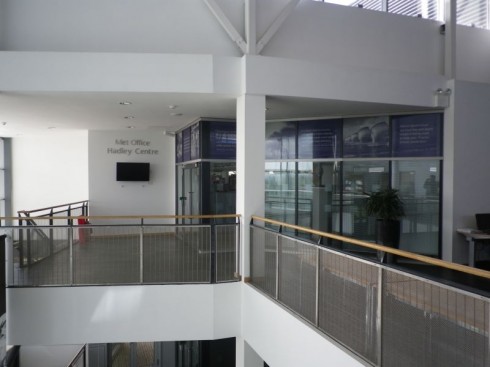
Guy Martin
24 Apr 12:49pm
Rob, I would suggest that you write to the Hadley Centre and inform them of your views which I do agree with. Whilst this site gives you the opportunity to vent your spleen unless you inform them directly they will not have the opportunity to rectify the situation,
Guy
chara
24 Apr 4:19pm
THANKS, Rob, for telling the truth about this experience. I very much feel that we all need to do a great deal more to “out” those who acknowledge climate change yet refuse to take any action. This needs to become a socially unacceptable position.
Peter Willcox
25 Apr 5:09pm
Oh Dear!!
I expect you have already made sure HC see this?!?
Peter
Caroline Walker
26 Apr 7:06pm
This must have been such a disappointing experience. I’m surprised because some years ago I saw a presentation from someone from the centre and it was authoritative and hard-hitting, pulled no lunches at all. I laughed out loud at the ‘fuel inefficient car’ remark.
It’s a bit like going to hospital and finding a Burger King in the reception area (as at Southampton General). Great hospital but what a mixed message.
Nigel H
26 Apr 8:26pm
I wonder whether the Hadley Centre is influenced at all by its major sponsor, i.e. DEFRA. The current decisions of that department on such issues as declining bee populations are incomprehensible to anyone who has any sort of scientific background. We should be questioning whose company the minister is keeping when he is not at his desk!
Trish Knox
27 Apr 9:06pm
Powerful story, Rob. I appreciate your emotions and logic. I saw the film Chasing Ice last week presented by the Sierra Club. Maybe the Met Office Hadley Centre can add this film to their public tours or use it to train their staff? It is an eye opener!
Johnny Thwaites
28 Apr 4:48pm
Hey Rob, nice one!
I liked the Marshall link – the psychological dynamics of disasters that seem to reinforce popular paradigms is especially interesting. Its not just in the climate change debate. Its in gun control, when a mass shoot out creates a redoubling of the desire to hold arms. Its in the penal system where evidence shows that prison causes re offending but we put more people in prison.
Especially interesting that through disasters people experience a richer sense of community in a way thats lacking in everyday atomised life. What can transition learn from this effect? Because what we are living through is a disaster…
J
James Mac
29 Apr 9:56am
what we got was an attempted humorous piece about how you couldn’t do anything about it anyway
I’ve had that, too.
From the convenor of the local Transition Group.
Shaun Chamberlin
29 Apr 10:40am
Wow, I’m stunned. I hope you get a response from the Hadley Centre.
Robert
29 Apr 8:53pm
The Daily Mail is the most popular newspaper in England, isn’t it? There must be readers everywhere… even working at the Hadley Centre.